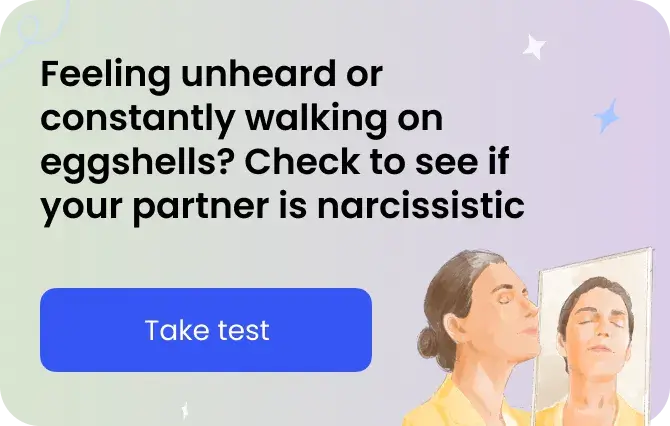I am Emily Mendez, a mental health expert and former psychotherapist. In this article, I will share with you my thoughts on how to stop being a narcissist. This advice comes from my expertise in mental health as well as my many years of experience in clinical practice.
Do you suspect you’re a narcissist? The term gets tossed around a lot. A formal diagnosis from a licensed professional is needed to know if you suffer from narcissistic personality disorder (NPD).
Most people who fit the criteria can check off every item on the 12 Narcissist traits list or take the partner narcissist test.
19 Steps on How to Stop Being a Narcissist
How do I stop being a narcissist before I ruin everything? It’s a question I’ve heard so many times in my practice. These tips will help you start making changes.
1. Try to Figure Out Why You’re Narcissistic
Narcissism often has roots in our earliest childhood experiences. One potential root cause of narcissism is childhood trauma.
For example, high levels of narcissism are associated with childhood trauma and abuse. Your narcissism could be a self-protective mechanism.
If you suffered abuse in childhood, your narcissism may be a coping tool. It helps you hide feelings of shame and inferiority. By acting arrogantly, you demand special treatment that makes you feel safe.
Childhood wounds don’t need to be dramatic to spur narcissism. In my experience, many of the narcissistic adults I’ve treated had parents who were unable to meet their emotional needs in childhood. Many also had parents who were cold or rejected them.
People with narcissism caused by a cold parental bond use grandiosity as a tool to assure themselves they are important.
Some people develop narcissism in opposite scenarios. As children, they could do no wrong. Their parents may have also coddled them against any criticism or pain from the “real world.”
A subset of this that I’ve seen often in my practice is golden child syndrome. This results from an unhealthy dynamic where one child is favored. Everything they do is perfect.
However, being a golden child also comes with pressure to succeed. Golden children can feel like their parents are living through them. They are also held up to an impossible standard. Many children of narcissistic parents are golden children.
It’s also possible that genetics and brain chemistry could influence narcissism.
2. Learn Your Triggers
I once had a client who was hated by her work colleagues. While she was an accomplished professional with an advanced degree and industry awards, she was constantly excluded. She also had the feeling that people were talking about her.
She couldn’t understand what made her so unlikable. Likewise, she felt that she had earned her spot at the top of the food chain. People should include her! They should seek her advice! It turns out that her sense of bravado was the problem.
In therapy, we discovered she had a one-upper concern. Every “congratulations” she gave to someone else was laced with a reminder of her own accomplishments.
This got us on the topic of triggers. Constantly asserting her achievements when others were being celebrated made her feel relevant. Our talk revealed that her parents were tyrannical about grades growing up. Whoever came home with the “A+” was celebrated. The sibling that didn’t was ridiculed and belittled.
This client was able to identify the feelings of fear and panic that set in when others were being celebrated. She then used that to remind herself not to automatically bring up her own accomplishments.
3. Time Yourself While Talking
Is it always the “YOU” show whenever there’s a conversation? Start keeping track of how much you’re speaking in a conversation. If you’re hogging all the words, this is a sign your narcissism is speaking. Prioritize listening and give-and-take interactions.
4. Speak Generally
Is every example you give about yourself? Embrace the art of “small talk” instead of “me talk.” Here are some easy ways to move the topic away from you:
Don’t: Talk about the dinner you made last night in detail.
Do: Mention a new local restaurant that you heard was delicious.
Don’t: Brag about how many miles you ran this morning.
Do: Talk about a recent game or sporting event that you watched on television.
5. Stop Taking Everything Personally
One of narcissists’s biggest pain points is that they take everything personally. Many narcissists walk around hurt and angry because they are offended by things that aren’t about them. For example:
- They assume every compliment for another person is a dig at them.
- They feel attacked when a friend or romantic partner is being silent.
- They feel excluded when not included in everything that goes on.
6. Step Back to Ask Questions
Narcissists can struggle with appearing interested in others. They don’t have a natural instinct to be reciprocal with information. The easiest way to fix this is to start asking questions. Don’t worry if it doesn’t come naturally.
Just follow a 1:1 ratio. For every question asked of you, ask the other person a question. You don’t need to have the skills of Diane Sawyer or Oprah Winfrey to ask good questions. Cling to one detail that you can ask a person to elaborate on to make them feel like you’re invested.

7. Accept That Perfection Isn’t Real
People with narcissistic personality traits can feel like they’re “better” than everyone else. Learning that you’re not is freeing! Narcissists often feel resentment about the shortcomings of others. Work on the skill of accepting and enjoying people “as they are.”
8. Resist the Urge to Control Others
There can be a strong urge to treat people like you’re arranging them on a chessboard. After all, you know best! You may also feel entitled to control events and situations. Letting go doesn’t happen overnight.
Most people with “controlling” narcissistic temperaments need therapy to change their behaviors. However, building awareness of this urge is the first step.
9. Get Comfortable With Criticism
Criticism is the #1 trigger for narcissistic traits. It’s as though every childhood wound pops open when someone critiques your work or actions. You might feel invalidated in the blink of an eye. Your self-protective side responds by dismissing the criticism. You may even attack the person delivering it.
This can make receiving helpful and important feedback impossible. In work settings, you may struggle to make improvements because you won’t hear critique. You may also hop from job to job. In relationships, it shuts you off to a partner’s valid feelings and concerns.
There’s a way to start embracing criticism. Allow yourself to hear what’s useful within the feedback. Mistakes and shortcomings can be learning tools. Remember that nobody is expecting you to be perfect.
10. Accept That You Can Be Lovable Without Being Perfect
The perfectionism and grandiosity that many people with narcissism cling to are like cloaks. Narcissists think they need to be “worthy” to be loved. This is why most have trouble admitting when they’re wrong.
Romantic partners of narcissists are often exhausted. Conversations quickly turn into verbal matches. There’s one major thing they typically don’t realize about their narcissistic partners.
For many, being wrong about something is equal to being wrong as a person. Admitting they’re wrong feels like admitting they’re bad, flawed, and unlovable. This often stems from parents who had zero tolerance for mistakes.
The journey of how to be less narcissistic is often about accepting that you can be wrong and loved simultaneously.
11. See Anger as a Warning Sign
Do you ever fall into fits of narcissistic rage? It can look like:
- Screaming.
- Stomping around, throwing things, and being explosive.
- Raging in response to feeling ignored.
- Physically attacking someone else.
Take an anger test to figure out if you have anger issues.
The good news about anger is that it can be a valuable “stop sign” if we know how to recognize it as it builds up. From my experience in practice, narcissist anger wells up for two reasons.
The first is that a person feels disrespected. They are angry that the other person doesn’t respect their authority and expertise. In their mind, the other party is deserving of rage because of their inferiority.
What’s really happening is that the narcissistic person feels invalidated. For them, especially for antagonistic narcissists, opposing views or noncompliance equals disrespect.
Their childhood mother or father wounds cause them to fear disrespect. They believe that being on top of the power dynamic is the only way to remain safe.
Being ignored is the other trigger of narcissist rage. I saw this play out most in my practice in romantic relationships.
Rage could be triggered by something as simple as a partner watching a movie without them. It also happens when a partner makes a decision without first consulting them.
Can you stop being a narcissist if you have anger issues? Anger doesn’t need to be suppressed. Instead, it needs to be understood. Catch yourself before the angry feeling goes outward. What you might find is a lot of hurt hiding beneath that rage.
12. Learn to Manage Stress
Overcoming narcissism can be hard because one can appear cool as a cucumber on the outside. What people don’t see is the intense pressure on the inside.
For a narcissist, stress can cause a feeling of vulnerability. Being vulnerable makes you want to “attack” the people around you. It’s a self-perpetuating cycle.
Learning better stress management can help to stop a feeling of crisis when you feel overwhelmed. Stress management looks different for all of us.
For you, it might look like changing your schedule. Perfectionist-leaning narcissists will often take on too much to prove their competence or superiority. They may expect the people around them to pick up the pieces of a hectic schedule instead of facing the consequences of over-committing.
13. Stop Seeing an Apology as a Death
Some people with narcissist traits truly feel like they’d rather die than apologize. This goes back to the idea that being wrong makes them “wrong” as a person.
Learning that “I’m sorry” doesn’t invalidate you as a person is so freeing! A strong and sincere apology does the following:
- Admits that you were wrong or misguided.
- Acknowledges that your actions affect others.
- Covers steps needed to repair the issue or rebuild trust.
14. Stopping Using the Silent Treatment
The silent treatment is the signature move of the narcissist! That’s because narcissists often feel that they need to “punish” the other person.
For someone who felt powerless growing up, silent treatment puts them in control of the power dynamic.
One of the key steps on how to stop being narcissistic is taking the silent treatment out of your communication toolkit and developing emotional intelligence.
15. Stop Shifting Blame
People with narcissistic personalities treat blame like a hot potato. They want to pass it on to other people.
If you’re wondering how to not be a narcissist, ditch the blame game. Blame is terrifying for a narcissist because it’s a form of shame. This is why they often focus on why other people “made” them do things.
In my practice, I’ve seen the way that losing fear of blame has helped clients become more confident. The beautiful secret their fear of blame hides is that accountability truly equals autonomy. By learning accountability, they begin to shed the grandiosity they used to hide behind.
16. Stop Using Passive Aggression
Many people are shocked to learn that narcissists can be timid. It can be covert narcissism. In short, covert narcissism is characterized by a subtle form of self-absorption that most outsiders can’t detect.
Covert narcissists rely on passive-aggressive behaviors instead of grandiosity. Additionally, they tend to hold on to grudges while waiting for the right time to strike.
What are tips for how to stop being a covert narcissist? The most important tool is empathy. Being a covert narcissist can be extremely isolating. For instance, their hypersensitivity and sense of entitlement prevent them from building emotional bonds.
Building your empathy muscle can help you identify with the feelings of others. This is ultimately the key to true connection.
17. Consider a Support Group
Can you stop being a narcissist without help? Changing behaviors without support is hard.
Many people with narcissism struggle to relate to people around them. A support group for people with narcissistic personality traits can feel comforting.
The truth is that lack of self-awareness can make narcissistic people unwilling to change. For example, group therapy can be an eye-opening experience that helps you learn you’re not the only person like this.
18. Be Willing to Let Go of the “Benefits” of Being a Narcissist
Can I stop being a narcissist if it’s working for me? I’ll never forget a client whose marriage was falling apart because of her narcissistic traits.
She wanted nothing more than to stay with her husband. We discussed some of the changes that would be necessary. Yet, she feared giving up her narcissism because it had worked so well for her.
Her narcissism-driven charm and ambition had helped her to make tons of money as a successful lawyer. Also, her toxic traits made her “successful.” Her ability to manipulate was her “secret weapon” in her career.
The truth is that narcissism “works” for many people. It can get you what you want on a superficial level. However, you’re probably looking for answers on how to stop being a narcissist because you’re unhappy.
When learning how to be less narcissistic, prepare yourself to give up the external benefits of manipulation.
19. Talk to a Therapist
Make sure you’re actually a narcissist. Some narcissism-like traits are actually attachment issues or personality disorders. Getting insights or a diagnosis can help you create an effective plan for overcoming narcissism.
This can include cognitive behavioral therapy (CBT), psychotherapy, holistic therapies, and other treatments for managing unhelpful traits.
Can You Stop Being a Narcissist? Answer From the Therapist
A person with narcissistic personality traits can certainly learn to undo their thought patterns. It’s more complicated if you’re diagnosed with NPD. While NPD can’t be cured, it can be managed.
With narcissism, grandiosity and superiority are replacements for connection. That’s often because attachment and connection are too “scary.”
The narcissist’s biggest fear is being vulnerable. The good news is that these self-protective traits can be managed. The first step is realizing that you don’t need the armor of self-importance to be safe.
Disclaimer
This article is for general informative and self-discovery purposes only. It should not replace expert guidance from professionals.
Any action you take in response to the information in this article, whether directly or indirectly, is solely your responsibility and is done at your own risk. Breeze content team and its mental health experts disclaim any liability, loss, or risk, personal, professional, or otherwise, which may result from the use and/or application of any content.
Always consult your doctor or other certified health practitioner with any medical questions or concerns
Breeze articles exclusively cite trusted sources, such as academic research institutions and medical associations, including research and studies from PubMed, ResearchGate, or similar databases. Examine our subject-matter editors and editorial process to see how we verify facts and maintain the accuracy, reliability, and trustworthiness of our material.
Was this article helpful?




